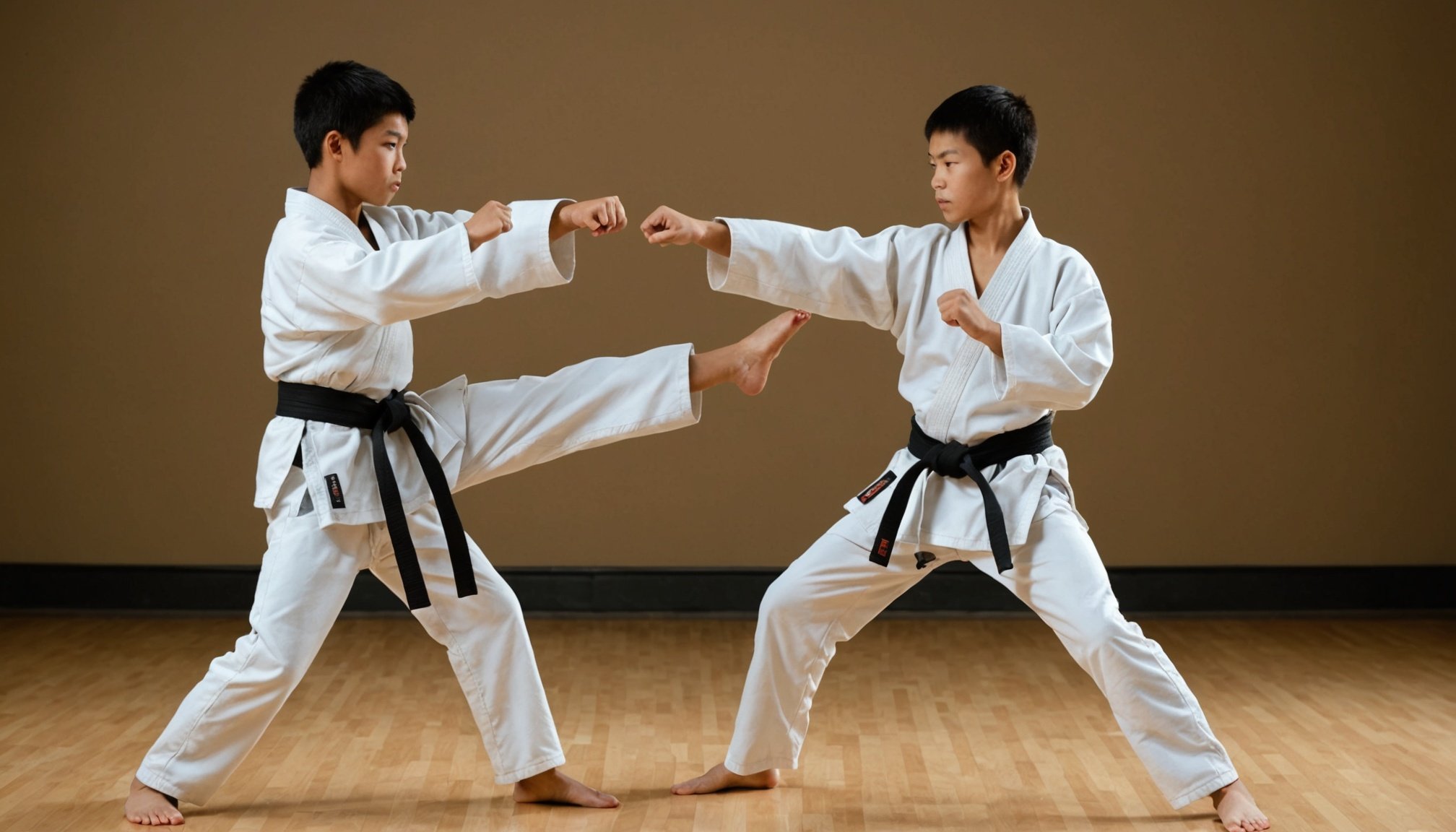Transforming Teen Behavior: How Regular Martial Arts Practice Can Lower Aggression in Adolescents
The Challenge of Adolescent Aggression
Adolescence is a period of significant growth and change, but it can also be a time of heightened emotions and impulsive behaviors. Aggression in teens is a concern for parents, educators, and the community at large. It can manifest in various ways, from verbal outbursts to physical altercations, and can have long-lasting effects on the individual and those around them. However, there is a proven method to help mitigate this aggression: regular martial arts practice.
The Martial Arts Advantage
Martial arts training is often misunderstood as promoting violence or aggression, but the reality is quite the opposite. Martial arts, such as karate, taekwondo, and Brazilian jiu-jitsu (BJJ), are designed to teach discipline, self-control, and respect. Here are some key ways martial arts can transform teen behavior:
In parallel : Exploring the Impact of Behavioral Therapy on Emotional Eating in Overweight Teens
Discipline and Self-Control
Martial arts classes emphasize the importance of discipline and self-control. Through consistent practice, teens learn to manage their emotions and actions. For instance, a study published on ResearchGate found that adolescents who participated in Taekwondo intervention significantly increased their self-regulation skills and mental health[5].
- **Focus and Commitment**: Martial arts require teens to focus and commit to their training, teaching them the value of hard work and perseverance.
- **Emotional Management**: Teens learn to manage their feelings, whether it’s frustration over a challenging technique or excitement over mastering a new skill.
- **Structured Environment**: Martial arts classes provide a structured environment where rules and guidelines are clearly defined, helping teens appreciate the importance of order and discipline.
Physical Benefits
While the mental and emotional benefits are significant, the physical aspects of martial arts training should not be overlooked. Here’s how physical activity in martial arts can impact teens:
Additional reading : Exploring the Power of Apps: Enhancing Memory Function in Dementia Patients Through Cognitive Support
- **Improved Physical Fitness**: Martial arts training involves movements that require agility, strength, and balance, improving overall physical health and cardiovascular endurance[4].
- **Reduced Stress**: Physical activity is a natural stress reliever, helping teens manage the pressures of school and personal life.
- **Better Sleep**: Regular physical activity can improve sleep quality, which is crucial for both physical and mental health.
Overcoming Challenges and Building Confidence
Martial arts training is not just about mastering techniques; it’s also about overcoming personal challenges and building confidence.
Setting and Achieving Goals
In martial arts, teens set and work towards achieving specific goals, such as advancing to the next belt level. This process helps them develop patience and perseverance.
- **Goal-Oriented Training**: Teens learn to set realistic goals and work towards achieving them, which enhances their sense of accomplishment and self-worth.
- **Progress Tracking**: The belt system in martial arts provides a clear track of progress, allowing teens to see the rewards of their hard work.
- **Celebrating Small Victories**: Each small victory, whether it’s mastering a new technique or participating in a tournament, reinforces their belief in themselves.
Building Social Skills and Respect
Martial arts classes are not solitary activities; they are part of a community that emphasizes respect and teamwork.
- **Respect for Others**: Teens learn to respect their instructors, fellow students, and themselves, which helps develop strong social skills[4].
- **Teamwork and Camaraderie**: Martial arts classes encourage teamwork and mutual support, fostering a spirit of kindness and cooperation.
- **Conflict Resolution**: Teens learn how to resolve disputes without aggression and how to handle challenging situations confidently.
Empowering Teens to Believe in Themselves
One of the most profound effects of martial arts training on teens is the empowerment it provides. Here’s how it can boost their confidence and self-belief:
Confidence Through Achievement
As teens progress in their martial arts journey, they achieve milestones that boost their self-esteem.
- **Achieving Belt Levels**: Advancing through belt levels is a tangible measure of progress, reinforcing their confidence in their abilities.
- **Participating in Tournaments**: Participating in martial arts tournaments provides an opportunity for teens to test their skills in a competitive but supportive environment.
- **Mastering New Skills**: Learning new techniques and mastering them builds a sense of competence and self-assurance.
Positive Reinforcement and Support
Martial arts classes provide a supportive environment where every effort is acknowledged and encouraged.
- **Encouragement from Instructors**: Instructors offer continuous positive reinforcement, helping teens feel valued and supported.
- **Peer Support**: Fellow students provide a network of support, cheering each other on and helping one another improve.
- **Community Engagement**: Many martial arts schools engage with the community, providing opportunities for teens to participate in events and activities that foster a sense of belonging.
Encouraging Responsible Use of Skills
A critical aspect of martial arts training is teaching teens the responsible use of their skills.
Using Martial Arts for Protection, Not Aggression
Instructors emphasize that martial arts are tools for protection, not aggression.
- **Scenario Training**: Teens are guided through scenarios that demonstrate the importance of using martial arts for defense rather than aggression[2].
- **Accountability**: The training instills a sense of accountability, helping teens understand that their skills come with great responsibility.
- **Wise Decision-Making**: Teens learn to make wise decisions in real-world situations, recognizing the power of restraint and peaceful conflict resolution.
Practical Insights and Actionable Advice
For parents or guardians considering martial arts for their teens, here are some practical insights and actionable advice:
Choosing the Right Martial Art
Different martial arts disciplines offer unique benefits. Here’s a brief comparison:
| Martial Art | Key Benefits |
|---|---|
| Karate | Emphasizes discipline, self-control, and physical fitness. |
| Taekwondo | Focuses on kicking techniques, improving flexibility and cardiovascular health. |
| BJJ | Concentrates on ground fighting, teaching submission holds and joint locks. |
| Mixed Martial Arts | Combines various disciplines, offering a well-rounded skill set. |
Finding the Right School
When selecting a martial arts school, consider the following:
- **Qualified Instructors**: Ensure the instructors are experienced and certified.
- **Safe Environment**: Look for a school with a safe and supportive training environment.
- **Community Engagement**: Opt for a school that engages with the community and offers additional activities.
Encouraging Consistency
Consistency is key in martial arts training. Here’s how to encourage your teen to stick with it:
- **Set Realistic Goals**: Help your teen set achievable goals and celebrate their progress.
- **Attend Classes Together**: Sometimes, attending classes together can be a great way to bond and stay motivated.
- **Positive Reinforcement**: Continuously offer positive reinforcement and support their efforts.
Martial arts training is more than just a physical activity; it is a holistic approach to personal development. By incorporating martial arts into their routine, teens can develop the discipline, self-control, and confidence they need to navigate the challenges of adolescence. Whether it’s through karate, taekwondo, BJJ, or any other discipline, the benefits of martial arts extend far beyond the dojo, influencing every aspect of their lives.
In the words of a martial arts instructor, “Martial arts is not just about teaching kids how to fight; it’s about teaching them how to live with integrity, respect, and self-control.” By embracing martial arts, we can empower our teens to become confident, respectful, and well-rounded individuals ready to face the world with poise and determination.











